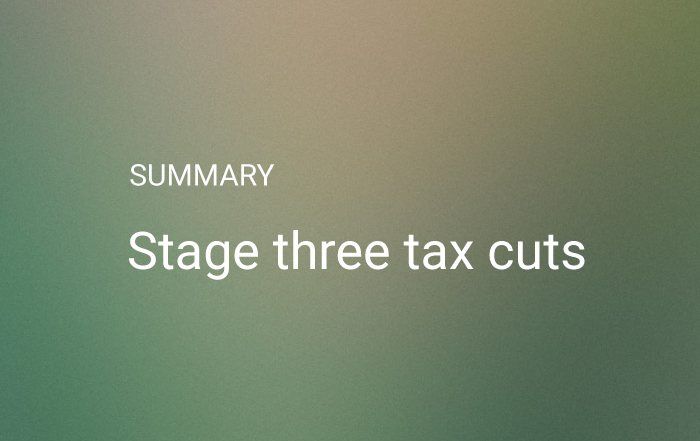
DFK Gooding Partners
August 23, 2018
GST collection changes aimed at residential property developers
By Lauren O’Neill, Manager – March 7, 2018
The Government announced in the 2017-18 Budget that from 1 July 2018 purchasers of new residential premises or land in new subdivisions will need to remit the GST on the purchase price directly to the Australian Taxation Office (ATO) as part of the settlement process. The Bill was introduced to the House of Representatives on 7 February 2018 and will become the law if enacted.
Reason for the proposed changes
The Government has determined some developers are selling property inclusive of GST and dissolving their business before remitting the GST to the ATO. The developer is pocketing the GST on the sale even though they have previously claimed GST on all development costs.
The ATO is also finding a significant increase in the use of illegal Phoenixing Arrangements. This is where a business is deliberately liquidated to avoid paying their debts, including all outstanding liabilities to the ATO. A new entity is created to continue the business of the liquidated entity. When a developer goes into liquidation, any outstanding GST liabilities are normally unrecoverable as the ATO becomes an unsecured creditor.
Current Law
Currently, the developer of new residential premises or sub-divided potential residential land is required to remit GST on the sale to the ATO in their next business activity statement. This provides a potential short-term cash flow benefit for a developer.
Proposed new law
To combat the propensity of these Phoenixing Arrangements and the non-payment of GST, the Government is proposing to shift the payment obligation in relation to GST on new residential premises to the purchaser.
- This will operate via a GST withholding model and will involve the purchaser or their representative settlement agent paying the GST directly to the ATO rather than to the developer at settlement.
- When the developer lodges their Business Activity Statement, they will claim a credit for the GST paid to the ATO by the purchaser on their behalf.
- There is no requirement for the purchaser to be registered for GST. This will add another layer of complexity in the developer’s record keeping.
This law will apply to new residential premises and the subdivision of potential residential land.
- Generally, the premises will be considered to be new residential premises where the property has not previously been sold as residential property, there have been substantial renovations, or an existing residential property was demolished and a new residential property built in its place.
- It is important to note that commercial residential properties are excluded from the withholding provisions.
- In relation to land sub-division, the legislation will apply to potential residential property, which is defined as land that is permitted to be used for residential purposes but does not yet hold any residential buildings.
The obligation to make the payment of GST falls on the purchaser. The developer (vendor) must provide a notice to the purchaser that states whether or not the purchaser is required to make the payment.
- Where the property is purchased by joint owners as tenants in common, the purchase is deemed to be a separate supply to each party in relation to their interest in the property, and they will each be liable for remitting their share of the GST.
- Where a property is purchased by joint owners as joint tenants, they are deemed to have made a single purchase and each party is obliged to make the payment of GST, and either one of the joint tenants can discharge this obligation.
To satisfy the obligation to make payment, the purchaser may provide a bank cheque for the GST amount made payable to the ATO to the seller on or before the day the payment is required to be made or pay the ATO direct. The seller is obligated to provide this bank cheque to the ATO immediately.
The GST must be paid on or before the day that any of the consideration is first provided. Normally the deposit is not treated as consideration as it is held in trust. The expected date would be the settlement date for the property.
What to consider if you are a Property Developer
Margin Scheme
The new legislation will apply differently, depending on whether the property is sold using the margin scheme or not.
- If the margin scheme is not used, 1/11th of the total sales price will be payable to the Australian Taxation Office by the purchaser.
- Under the margin scheme, the rate of withholding is 7% of the contract price or the price of the supply. The rate of withholding may be a greater percentage (not exceeding 9%) if so determined by the Minister.
Notification to Purchasers
As a supplier of new residential property or land, the developer will be required to notify the purchaser in writing of the amount to be paid to the ATO before making the sale, together with the name and ABN of the entity that makes the supply.
- It is an offence to fail to notify the purchaser prior to the sale of the property.
- The maximum penalty for this is 100 penalty units. A penalty unit is currently $210, which is equates to a penalty of $21,000. If a corporation is found guilty of the offence, the court may impose up to five times the penalty.
Transitional Provisions
These provisions will apply to the sale of all new residential premises or potential residential sub-divided land from 1 July 2018.
- Where contracts were entered into before 1 July 2018, and the proceeds from the sale are received before 1 July 2020, the sale is excluded from these provisions.
- Contracts for the sale of property that were entered into prior to 1 July 2018 and that settle after 1 July 2020, will be subject to the new withholding rules.
- The seller will also have an obligation to notify the purchaser of the GST to be remitted before selling the property.
Any contracts entered into after 1 July 2018 will be subject to the withholding obligations.
Cash Flow Implications
Developers will need to manage their cash flow as the cash consideration they receive at settlement will be the GST exclusive sales price. Currently, developers have the benefit of the GST component of the sales price being available to them in cash between the settlement date and the due date of their next Business Activity Statement, which allows for greater flexibility in cash flow management. This will need to be reviewed as these changes will impact this significantly.
Borrowers may need to consider the impact these rules will have on their loan arrangements with their Lenders. Lenders will likely be assessing the adequacy of their security or might be reluctant to fund the GST component of progress claims on the seller’s works going forward.
If you wish to discuss further or would like to know how this could potentially affect you and your business, please contact our office









